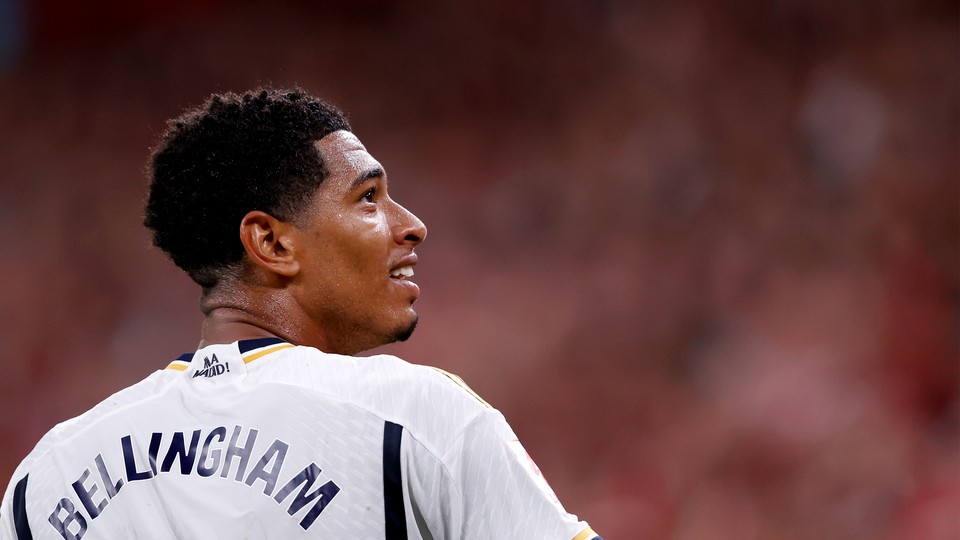The Goal That Saved England
4 min read
Did you see it? If you’re English, or if you were in England or in the vicinity of an English person, anywhere in the world, you probably saw it: Jude Bellingham’s goal last Sunday night in Gelsenkirchen, for England, against Slovakia. A bicycle kick, a backward over-the-head strike, classically executed. A design in air, like something traced swiftly with an angelic fingertip. Clean connection: Bam! Immobilizing the goalkeeper. Funneling time through a point. It was more than beautiful. It was weightless. Pure play. It expressed, you might say, the true frivolity of atoms.
It was also massively, cumbrously, gravitationally, heavy-metallically, almost psychotically necessary. Had Bellingham not scored—
But he did.
But had he not—
A bit of context might be helpful here. English soccer’s elite players are currently contesting, in the roaring stadia of host nation Germany, the once-every-four-years, 24-country UEFA European Championship. To say that in the early stages of the tournament they have not been very good would be a violent understatement. England has been mind-alteringly bad. At times, it has seemed to be playing a different sport: a lunar soccer, perverse and cerebral, whose aim is not to drive heartily toward your opponent’s goal but to pass the ball backwards, foreclose your opportunities, mistime your runs, carefully stifle any accidental energy flare-ups, and create dead spaces of ennui and bamboozlement all over the pitch. All over the country. They have induced despair, real despair, in their fans.
And perhaps in their opponents, because somehow, they’re still in it. Lumbering stalely through the group stage, each performance—against Serbia, against Denmark, against Slovenia—more clogged and alienated than the last, England improbably gained the required points. And so to Gelsenkirchen on Sunday night, and the game against Slovakia.
How to explain the English attitude toward our national team? We think we’re going to win, but we know we’re going to lose. Is that it? We are haunted by entitlement, but we live in failure. We’re the Grey Gardens of footballing nations. Gareth Southgate, the manager of England’s national team for almost eight years, is an appropriately confusing and divisive figure. Dresses nicely, talks well, is comfortable with feelings, disapproves of Brexit, gets a result now and then. But mainly what he does, like a wicked enchanter, is stultify his players. Great players, some of them. He encases them in uselessness. His teams are timid to the point of impotence: They poke; they footle; they recoil. His in-game decisions are nonexistent. Or rather, he makes one in-game decision: to thoroughly consider all the options, and then leave everything exactly as it is.
Slovakia, not the greatest team, scored early: a chancy, grabbed goal in the 25th minute. They were running hard, getting stuck in, digging for scraps. They were playing football, for God’s sake. The England style, its vehement numbness, would not be altered. Nothing connected. No runs were made. No shots were taken. Back pass, side pass. Back pass again. Excruciatingly slow buildup play that punctually snuffed itself out around the halfway line. Was this a prank? A windup? Seriously—were they trying to drive us mad? I was very impressed with the volatility of the England fans in the stadium at Gelsenkirchen: now jeering, whistling and booing, full of suicidal disgust at their team’s performance, and now—at the slightest flicker of enterprise or courage, if the ball traveled forward just a couple of feet—passionately aroused and even singing “God Save the King.”
At halftime, the studio pundits were ranting. About the impossibility of things continuing as they were, about the inevitability of substitutions. Surely Southgate would “rip up the script” and send out a radically refitted lineup for the second half? He had to.
But of course he didn’t. Out trotted the same 11 players, horribly obedient to their fate. It continued. It became quite stately in its awfulness. The announcers, spooked, began to mutter about a strange malaise, a state of possession, an “inexplicable paralysis.” The minutes ticked by: 60, 70 … Late, too late, Southgate made a few substitutions. Nothing changed. Cross-eyed with stress, going bald in real time, Southgate was doing nothing. Hamlet on the touchline, his face gnawed and feverish. Eighty minutes, 90 … This was abject. The end of football. The end of England. Inquest and breakdown. Southgate would lose his job—or worse. Those fans, mere feet away from him, what he’d put them through!
And then, after 94 minutes and 34 seconds of cancerous non-football … Jude Bellingham. Hanging in air, his feet above his head, he inverted reality at a stroke: It was terrible, it was terrible, it was terrible—and then, suddenly, it was amazing. As one elated announcer put it, “He’s turned England upside down!” The game went into extra time. Fifty-two seconds in, Harry Kane (until this point a heavy-legged shadow, a real Southgate man) scored again, and that was that: England 2, Slovakia 1.
Now what? On Saturday, England plays Switzerland—keen, well-grooved Switzerland—by which point the United Kingdom will literally be a different country, with a new Labour government. Hold on to hope. Hang on to your hats. In Gareth we (insanely) trust. Anything’s possible, damn it.



